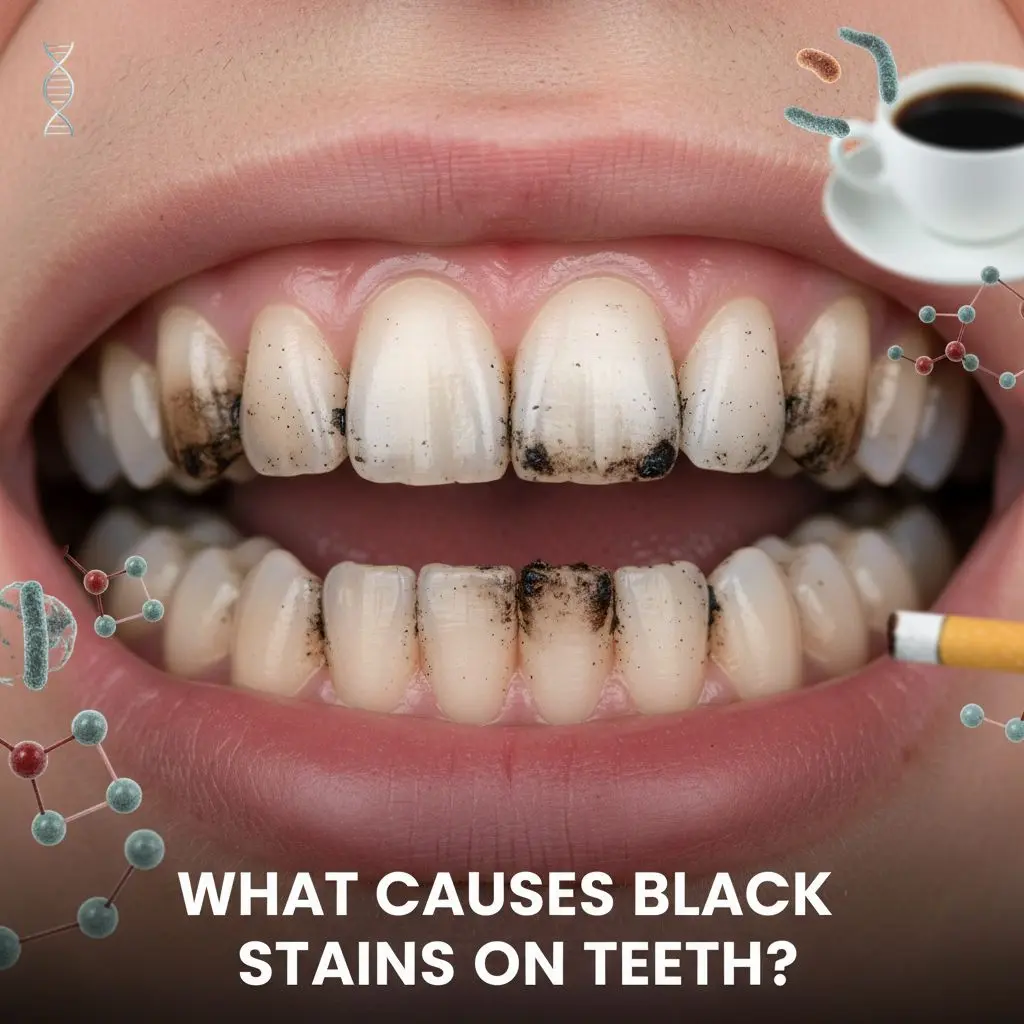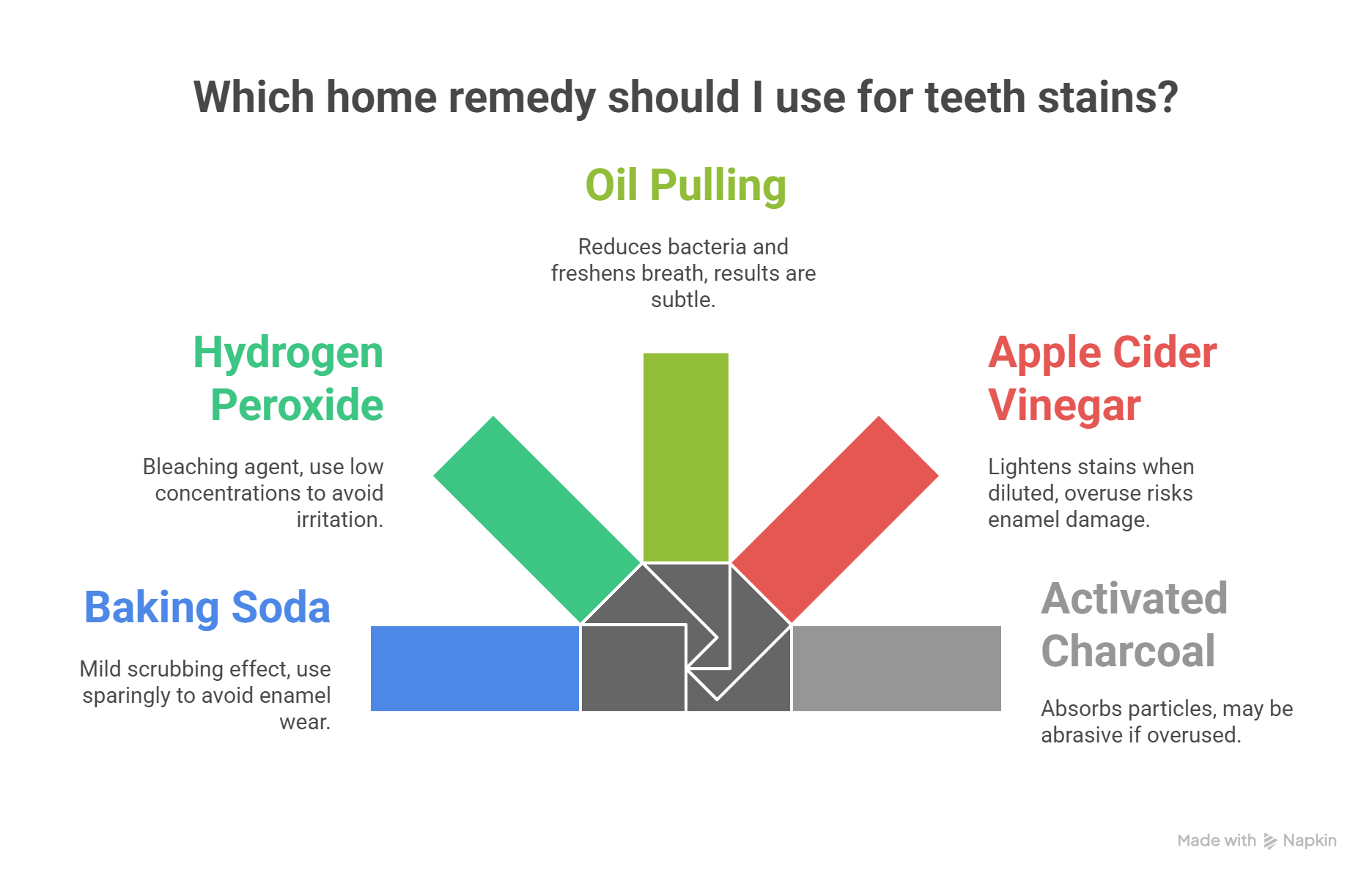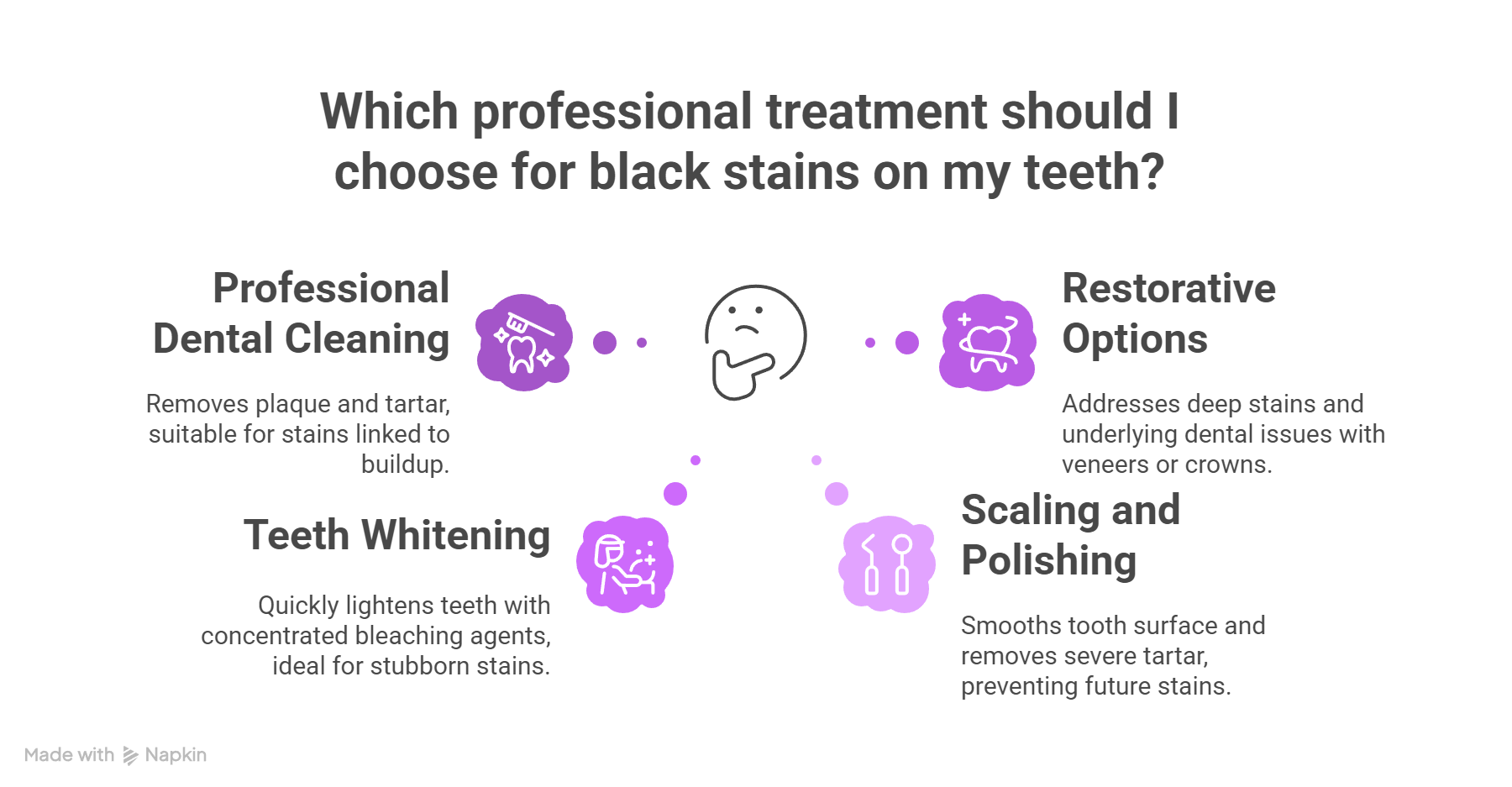Black stains on teeth can be frustrating and often point to poor oral hygiene, tartar buildup, or even tooth decay.
These dark stains weaken tooth enamel and cause unwanted tooth discoloration, making your smile look dull.
The good news is that black stains are treatable. With simple steps like brushing, using baking soda, and scheduling a professional dental cleaning, you can lift surface stains effectively.
Teeth whitening also helps restore brightness. Here is how to get rid of black stains on teeth safely.
What Causes Black Stains on Teeth?

Black stains on teeth can develop for many reasons, ranging from everyday habits to more complex biological factors. The most common triggers are poor oral hygiene, tartar buildup, and lifestyle choices. Smoking or chewing tobacco can leave dark stains that cling to the tooth surface, while drinking coffee, tea, or red wine often causes tooth discoloration over time.
Researchers have also identified more specific causes. Certain bacteria, such as Actinomyces and Prevotella melaninogenica, produce compounds that show up as black pigmentation on tooth enamel. High levels of iron in saliva, whether from diet or liquid iron supplements, can also increase the risk of stains. Some studies even suggest genetics and unique oral microbiomes may make certain families more prone to teeth stains.
Understanding these causes helps you recognize whether you are dealing with surface stains that can be polished away at home or deeper discoloration that requires professional dental cleaning.
Extrinsic vs Intrinsic Stains on Teeth
Not all teeth discolorations are the same. Extrinsic stains form on the outer layer of tooth enamel. These are usually linked to habits like drinking coffee, red wine, or using tobacco, and they often show up as surface stains that are easier to polish away. A whitening toothpaste or professional dental cleaning can help remove surface stains effectively.
Intrinsic stains are different. They occur inside the tooth and may be caused by dental caries, trauma, or certain medications. Unlike extrinsic stains, intrinsic stains create deeper tooth discoloration and often need professional treatments such as bleaching or restorations. Some studies suggest children with black stains may have fewer cavities due to unique bacterial patterns, but these stains still require management.
Home Remedies for Black Stains on Teeth

If you notice mild discoloration, simple home remedies can sometimes help. While these options are not replacements for professional treatments, they may improve stained teeth at the surface level.
-
Baking soda: Creates a mild scrubbing effect that can lift surface stains. Use sparingly once a week to avoid wearing down tooth enamel.
-
Hydrogen peroxide: Works as a bleaching agent to brighten teeth, often used in whitening strips and home whitening kits. Use low concentrations to avoid irritation.
-
Oil pulling: Swishing coconut or sesame oil may help reduce bacteria and freshen breath. Results are subtle and gradual.
You can learn more about the process in our complete guide on oil pulling for teeth.
-
Apple cider vinegar: Can lighten black teeth stains when diluted, but overuse risks damaging enamel.
-
Activated charcoal: Absorbs particles and can reduce surface stains, though it may be too abrasive if used too often.
These home remedies are best suited for mild discoloration. For persistent black stains or deep stains, professional treatments are more reliable.
How to Prevent Black Stains on Teeth
Keeping teeth healthy and stain-free starts with prevention. Here are practical ways to stay ahead of black stains:
-
Practice good oral hygiene by brushing with fluoride toothpaste twice daily and flossing once a day.
-
Rinse with water after drinking coffee, tea, or red wine to minimize the staining of beverages lingering on your teeth.
-
Quit smoking or chewing tobacco to avoid stubborn stains and other oral health issues.
-
Stick to regular brushing with a soft toothbrush to avoid gum line irritation.
-
Try whitening toothpaste occasionally to maintain a white smile and remove surface stains before they harden. Look for formulas with fluoride or hydroxyapatite, both of which help strengthen tooth enamel while supporting long-term whitening results.
Dentists also recommend maintaining good oral hygiene to protect against gum disease and plaque buildup, which can eventually lead to black teeth stains.
Professional Treatments for Black Stains on Teeth

When home remedies are not enough, professional treatments offer stronger results. Dentists use targeted methods to remove black stains on teeth safely and effectively.
-
Professional dental cleaning: A dental hygienist uses specialized tools to remove plaque buildup and tartar. This is the standard option for stains linked to tartar buildup.
-
Teeth whitening: In-office whitening treatments use concentrated bleaching agents to lighten teeth quickly, especially helpful for stubborn stains.
-
Scaling and polishing: Useful when tartar buildup is severe, leaving the tooth surface smooth and stain free.
-
Restorative options: Veneers, bonding, or crowns may be recommended for deep stains or when underlying dental issues like tooth decay are present.
Recent research suggests minimally invasive techniques are best, since aggressive scaling could damage tooth enamel. Dentists may also suggest newer options like probiotic rinses or herbal toothpaste with Achyranthes aspera, shown to reduce stain-causing bacteria.
Why Regular Dental Visits Matter for Stains
Even with regular brushing, some stains from teeth cannot be removed at home. Professional cleaning every six months helps remove plaque and tartar before they harden into persistent black stains. During these visits, a dentist can check for tooth decay, gum disease, or other dental concerns that might be hiding behind discoloration.
Studies show recurrence of black stains is common, so ongoing care is essential. Regular dental checkups also allow early detection of underlying dental issues and provide tailored treatment options.
How to Maintain a Bright Smile After Stain Removal
Once stains are removed, keeping a stain-free smile takes consistent care. Brushing and flossing daily, using whitening toothpaste occasionally, and rinsing with fluoride mouthwash can help maintain results. Avoiding staining foods, quitting tobacco use, and scheduling regular dental checkups make a big difference.
For those prone to recurrent stains, dentists may suggest home whitening kits or touch-up whitening treatments. SNOW makes this easier with enamel-safe products designed for daily care and long-term results:
-
Whitening Toothpaste with Hydroxyapatite: Strengthens tooth enamel and removes surface stains.
-
LED Whitening Electric Toothbrush: Delivers deep cleaning power while protecting gums.
-
At-Home Whitening Kit: Brightens teeth safely and effectively, even for sensitive users.
-
Whitening Wand/Pen: Perfect for quick touch-ups between treatments.
Pairing these with healthy habits like rinsing after meals and limiting staining beverages will help you keep your teeth healthy, reduce persistent stains, and enjoy a bright, confident smile.
Final Thoughts
Black stains on teeth may look intimidating, but they are not permanent. From home remedies like baking soda and whitening toothpaste to professional dental cleaning and whitening treatments, there are plenty of safe and effective ways to restore your smile. The key is knowing whether you are dealing with surface stains or deeper intrinsic discoloration, then choosing the right treatment plan with your dentist’s guidance.
At SNOW, we’re all about safe, practical solutions that protect your enamel and keep your smile looking its best. Ready to get started? Your brighter smile awaits! Shop now.
FAQs
Got black stains on teeth? Here are quick answers to the most common questions.
How can I get rid of black stains on my teeth?
You can get rid of black stains on teeth by combining regular brushing, daily flossing, professional dental cleanings, and whitening treatments. For stubborn stains on teeth, your dentist can safely remove them with specialized tools and treatments.
Can black marks on teeth disappear on their own?
Black marks on teeth do not usually disappear on their own. Some surface stains may fade with good oral hygiene, but deeper or persistent black marks often require professional treatment to clear them up fully.
What causes black stains on teeth?
Black stains on teeth are commonly caused by plaque buildup, tartar buildup, staining drinks such as coffee and tea, tobacco use, poor oral hygiene, and, in some cases, tooth decay.
How do I remove black plaque?
You can remove black plaque by maintaining consistent brushing and flossing, using an antibacterial mouthwash, and visiting your dentist regularly for professional dental cleanings to keep plaque and black stains away.
If you enjoyed this article, check out these related posts:
- What Does a Tooth Stain Look Like
- Does Blood Stain Teeth
- Yellow Spots Between Teeth
- How to Fix Stained Teeth
- Types of Stains on Teeth
- Can Hard Water Stain Teeth
- Teeth Stains and Discoloration
- Can Porcelain Teeth Stain
- Why Do Drinks Stain Teeth
- How Long to Leave Teeth Whitening Strips on
- What Happens If You Leave Teeth Whitening Strips on Too Long?
- Can You Use Teeth Whitening Strips While Breastfeeding?
- Best Time to Use Teeth Whitening Strips
- Can You Sleep with Teeth Whitening Strips?
- Can I Drink Water After Teeth Whitening Strips?

































































